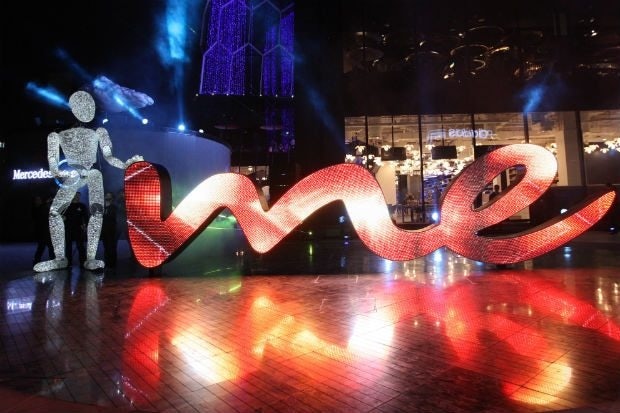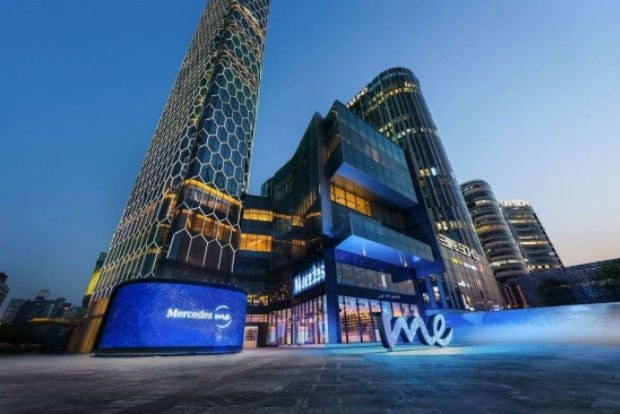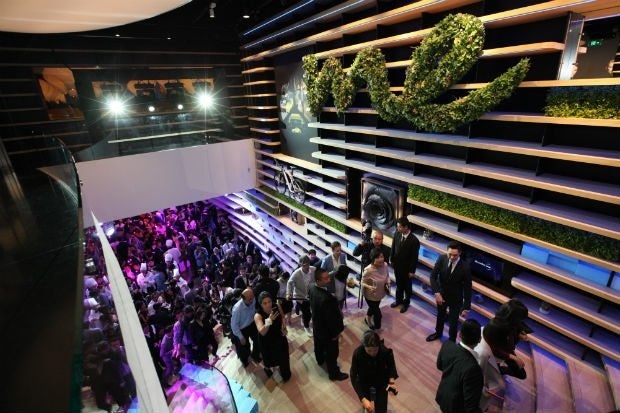
It's been two weeks since Mercedes me, Daimler's Mercedes-Benz lifestyle space and experience center, opened with a bang in time for Auto China 2016, but its presence in Beijing's Sanlitun district is no less dramatic now. A theater-sized screen and speakers broadcast auto race clips to passerby within a sizable radius, while a monumental logo casts its rainbow lights on one of the capital's busiest intersections. This Mercedes me installment is Daimler's largest in the world, and comes with the hope that mainland Chinese consumers want much more than to simply buy a new luxury car off a showroom floor.

The new space, located next to the towering InterContinental Beijing Sanlitun, features two restaurants—one is Si Fang San Chuan, a contemporary Chinese restaurant featuring a mix of Yunnan, Sichuan, and Guizhou cuisine, and the other is Me Cafe, which has Yunnanese coffee and a modern Southeast Asian menu. Around the front is a juice bar and a space that functions as both a lobby and work area. On the second floor is Lighthaus, a cocktail bar by Warren Pang, the founder of the acclaimed Janes and Hooch, on the Forbes 2016 list of 50 best bars in Asia. Sharing a panoramic view of Sanlitun is an AMG lounge with Mercedes' short films projected on pods on the ceiling, and nearby, a gallery showcases a rotating selection of mixed media art.
Then there are the cars. At the front of the facility is a small retail area with branded merchandise and model cars topping out at 1,000 RMB ($150). At the back are two to three brand new vehicles that customers can only test drive—they can't buy. If customers are interested in finding out how to purchase a Mercedes, there are expert staff on hand to walk them through the process or lead them through interactive digital experiences. Adding another dimension to it all are regularly scheduled events. Last week, for instance, Mercedes Me hosted a party for local speed fiends, featuring a simulator challenge where the winner received an AMG Driving Academy course.

This is Mercedes-Benz’s first Mercedes me location on the mainland and sixth in the world, with others in Tokyo and Hong Kong, as well as Hamburg, Milan, and Munich. The stores are an offline manifestation of online services offered by Mercedes me, which includes connecting the car owner's smartphone to their vehicle and maintenance and repair assistance. Beijing's store was designed by German architect HG Merz and collaborated on with Beijing-based marketing and branding company Cakeshop Consulting.
Cakeshop co-founder Alex Chen and his partners Elaine Yu and Milan Sekulic all were former employees of Hong Kong's Swire hotels, which, Chen said, highly influenced their decision-making when it came to working on Mercedes me. “We came in and said we all live in Beijing,” he said. “We need to have a conversation about what we want.” Thus, the Me Cafe menu offers dishes hard to find even in the most cosmopolitan of Beijing's districts.
But Cakeshop was also aiming to help create a destination that would be accessible to China's middle-class consumer, which explains the central and foot traffic-heavy location, which is highly unusual for the average experience center. And while the cars come at a premium price, the food is more accessible, with meals averaging around 250 RMB per person, so as to provide “a luxury experience without the 15 percent surcharge.”
“Now the market is so much more competitive, Mercedes has very innovatively decided to say, 'hey, let's create the Mercedes me brand to give both Mercedes owners and those who don't own a Mercedes a chance to get closer to the brand and to understand the brand,'” Chen said.
Mercedes-Benz performance in China is expected to moderate this year, but overall, its new SUV models and sedans have done well in the market. In the first quarter, the company saw a 39 percent year-on-year growth, almost three times that of BMW. One could hardly claim the brand is struggling with demand, unlike top luxury fashion houses, some of which are branching out into F&B to fend off the repercussions of China's economic slowdown. However, across the industry and around the globe, there is a standard being set where there now is a need for luxury labels to connect to a market of new, younger, and financially aspirational consumers.